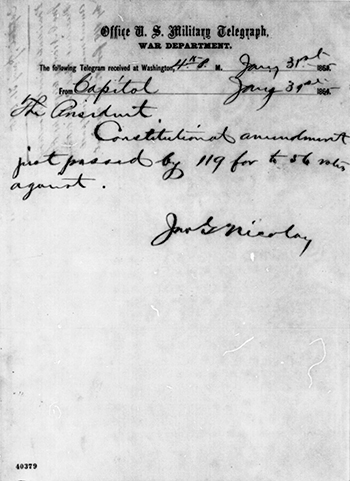
The Thirteenth Amendment to the U.S. Constitution, sent to the states for ratification in February 1865 with the unanimous support of congressional Republicans and the firm endorsement of President Abraham Lincoln, contained two short sections. The first prohibited slavery and involuntary servitude except as punishment for convicted criminals. The second pronounced in arguably vague terms that Congress had the power to enforce this prohibition "by appropriate legislation." The amendment reflected the North's determination, after four years of Civil War, to make legal, permanent, and more encompassing Lincoln's 1863 Emancipation Proclamation. However, what rights would be granted the former slaves and what powers Congress had under the enforcement clause were left ambiguous.
After Lincoln's assassination, President Andrew Johnson made clear to the South that ratification of the Thirteenth Amendment was one of his minimum requirements for readmission to the Union. The proceedings and results in North Carolina were typical of the actions southern states offered in response. On 29 Nov. 1865, two days after the new North Carolina legislature convened, Rufus Y. McAden introduced a resolution for approval of the Thirteenth Amendment. Debate centered on the second section. Many North Carolinians feared that this provision would allow Congress to regulate civil rights, thus depriving the states of their traditional control over race relations and legal privileges. Supporters tried to assure doubters that Secretary of State William H. Seward was correct in his interpretation that the "clause is really restraining in its effect, instead of enlarging the power of Congress." Faced with the knowledge that rejection of the amendment meant the continuation of federal control over the state, the North Carolina House approved the amendment 100 to 4.
In the Senate, the same debate ensued, but on 4 December that body also ratified the amendment. But opposition forces quickly regrouped, and on the same day Senator A. D. McLean of Cumberland County introduced a resolution "touching" the Thirteenth Amendment; the resolution explicitly stated that North Carolina ratified the amendment only "in the sense given to it" by Seward, "to wit: That it does not enlarge powers of Congress to legislate on the subject of freed men within the States." Although the General Assembly clearly understood that McLean's resolution had no legal effect, both houses endorsed it.
By 15 Dec. 1865, the necessary three-fourths of the states had ratified the Thirteenth Amendment and Seward proclaimed it in effect. With that action slavery, already recognized as ended in North Carolina after the state's 1865 constitutional convention, was now legally and permanently terminated by the U.S. Constitution.